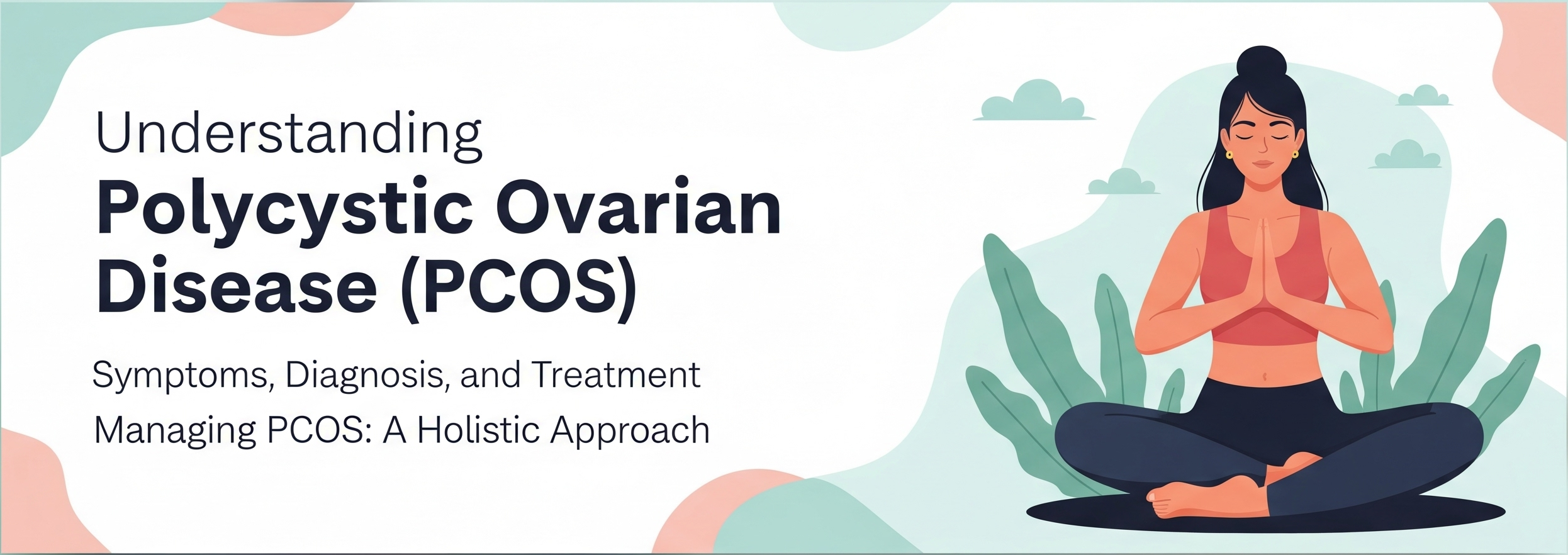Understanding Polycystic Ovarian Disease (PCOS): Causes, Symptoms, and Management
Polycystic Ovarian Disease (PCOS), also known as Polycystic Ovarian Syndrome, is one of the most common endocrine disorders affecting women of reproductive age. It is a complex condition that can have far-reaching effects on a woman’s physical health, emotional well-being, and quality of life. Despite its prevalence, PCOS remains widely misunderstood, and many women go undiagnosed or untreated for years. This article aims to provide a comprehensive overview of PCOS, including its causes, symptoms, diagnosis, and management strategies.
What is PCOS?
PCOS is a hormonal disorder characterized by an imbalance in reproductive hormones, which can lead to a variety of symptoms and health complications. The name “polycystic ovarian disease” refers to the presence of multiple small cysts on the ovaries, although not all women with PCOS have these cysts. The condition is primarily associated with three key features:
- Irregular or absent menstrual cycles: Women with PCOS often experience infrequent, prolonged, or absent periods due to irregular ovulation.
- Hyperandrogenism: Elevated levels of male hormones (androgens) can cause symptoms such as acne, excessive hair growth (hirsutism), and male-pattern baldness.
- Polycystic ovaries: The ovaries may become enlarged and contain small, fluid-filled sacs (follicles) that surround the eggs.
PCOS is not just a reproductive disorder; it is also a metabolic condition that can increase the risk of developing other health issues, such as type 2 diabetes, cardiovascular disease, and obesity.
Causes of PCOS
The exact cause of PCOS is not fully understood, but it is believed to result from a combination of genetic, hormonal, and environmental factors. Some of the key contributors include:
- Hormonal Imbalance: Women with PCOS often have higher-than-normal levels of androgens, which can interfere with the development and release of eggs during ovulation. Insulin resistance is also common in PCOS, leading to elevated insulin levels that can further stimulate androgen production.
- Insulin Resistance: Many women with PCOS have insulin resistance, meaning their bodies cannot use insulin effectively. This can lead to high blood sugar levels and an increased risk of type 2 diabetes. Insulin resistance also contributes to weight gain, which can exacerbate PCOS symptoms.
- Genetics: PCOS tends to run in families, suggesting a genetic component. If a close relative (such as a mother or sister) has PCOS, the risk of developing the condition is higher.
- Inflammation: Low-grade inflammation is common in women with PCOS and may play a role in stimulating the ovaries to produce androgens.
- Lifestyle Factors: Sedentary lifestyles, poor dietary habits, and stress can contribute to the development and progression of PCOS.
Symptoms of PCOS
The symptoms of PCOS can vary widely from one woman to another, and they may change over time. Some of the most common symptoms include:
- Menstrual Irregularities: Infrequent, irregular, or prolonged menstrual cycles are a hallmark of PCOS. Some women may experience fewer than eight periods per year or none at all.
- Excessive Hair Growth (Hirsutism): Elevated androgen levels can cause excessive hair growth on the face, chest, back, or other areas where men typically grow hair.
- Acne and Oily Skin: Androgens can increase oil production in the skin, leading to acne breakouts, particularly on the face, chest, and upper back.
- Weight Gain: Many women with PCOS struggle with weight gain or difficulty losing weight, especially around the abdomen.
- Hair Loss: Thinning hair or male-pattern baldness can occur due to high androgen levels.
- Skin Darkening: Dark patches of skin, known as acanthosis nigricans, may develop in areas such as the neck, groin, and under the breasts.
- Infertility: PCOS is one of the leading causes of female infertility due to irregular or absent ovulation.
- Mood Changes: Women with PCOS are at a higher risk of experiencing anxiety, depression, and mood swings.
Diagnosis of PCOS
Diagnosing PCOS can be challenging because its symptoms overlap with those of other conditions. There is no single test for PCOS; instead, doctors rely on a combination of medical history, physical examination, and diagnostic tests. The Rotterdam criteria are commonly used for diagnosis, which require the presence of at least two of the following three features:
- Irregular or absent periods.
- Clinical or biochemical signs of hyperandrogenism.
- Polycystic ovaries on ultrasound.
Additional tests may include blood tests to measure hormone levels (such as androgens, luteinizing hormone, and follicle-stimulating hormone) and glucose tolerance tests to assess insulin resistance.
Health Risks Associated with PCOS
PCOS is not just a reproductive issue; it can have serious long-term health consequences if left unmanaged. Some of the potential risks include:
- Type 2 Diabetes: Insulin resistance increases the risk of developing type 2 diabetes.
- Cardiovascular Disease: Women with PCOS are at a higher risk of high blood pressure, high cholesterol, and heart disease.
- Endometrial Cancer: Irregular periods can lead to a buildup of the uterine lining, increasing the risk of endometrial cancer.
- Sleep Apnea: Obesity and hormonal imbalances can contribute to sleep disorders.
- Mental Health Issues: The emotional toll of PCOS can lead to anxiety, depression, and poor self-esteem.
Management and Treatment of PCOS
While there is no cure for PCOS, the condition can be managed effectively through a combination of lifestyle changes, medications, and therapies. The goals of treatment are to regulate menstrual cycles, reduce symptoms, and prevent long-term complications.
- Lifestyle Modifications:
- Diet: A balanced diet rich in whole grains, lean proteins, fruits, and vegetables can help manage insulin levels and promote weight loss. Reducing sugar and refined carbohydrate intake is particularly important.
- Exercise: Regular physical activity can improve insulin sensitivity, aid in weight management, and reduce symptoms.
- Stress Management: Practices such as yoga, meditation, and mindfulness can help reduce stress, which may improve hormonal balance.
- Medications:
- Hormonal Birth Control: Oral contraceptives can regulate menstrual cycles, reduce androgen levels, and improve acne and hirsutism.
- Metformin: This medication, commonly used to treat type 2 diabetes, can improve insulin sensitivity and regulate ovulation.
- Anti-Androgens: Medications such as spironolactone can reduce excessive hair growth and acne by blocking the effects of androgens.
- Fertility Treatments: For women trying to conceive, medications like clomiphene citrate or letrozole can stimulate ovulation.
- Alternative Therapies:
- Acupuncture: Some studies suggest that acupuncture may help regulate menstrual cycles and reduce PCOS symptoms.
- Herbal Supplements: Certain herbs, such as spearmint tea and cinnamon, have shown promise in managing PCOS symptoms, though more research is needed.
- Surgical Options:
- Ovarian Drilling: A minimally invasive surgical procedure that can trigger ovulation in women who do not respond to medication.
Living with PCOS
Living with PCOS can be challenging, but with the right support and management strategies, women with the condition can lead healthy, fulfilling lives. It is important to work closely with healthcare providers to develop a personalized treatment plan. Additionally, connecting with support groups or online communities can provide emotional support and practical advice.
Conclusion
Polycystic Ovarian Disease (PCOS) is a multifaceted condition that requires a holistic approach to management. By understanding the causes, symptoms, and treatment options, women with PCOS can take proactive steps to improve their health and well-being. Early diagnosis and intervention are key to preventing long-term complications and ensuring a better quality of life. If you suspect you may have PCOS, consult a healthcare professional for a thorough evaluation and personalized care plan. With the right support, living well with PCOS is entirely possible.
New chat



